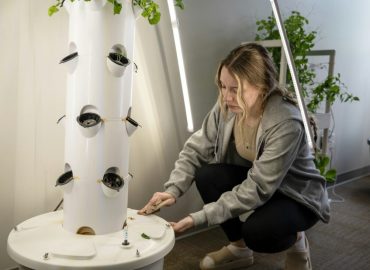Vertical Farming Office Space
Indoor vertical farms take root in cities with empty office space
Cities are looking for ways to take advantage of empty commercial buildings as many businesses that formerly occupied these spaces have gone remote.
Vertical Farming Office Space | Maya Rodriguez |
Just outside the nation’s capital, in the urban enclave of Arlington, Virginia, a new purpose is in bloom.
“Above me, we have leeks and carrots — and we actually have some basil and radishes and turnips and other things,” said Jacqueline Potter of Area 2 Farms, a Virginia-based vertical farming operation.
Area 2 Farms grows more than 180 different varieties of herbs and produce.
“Baby kale, we have spring mix, we have rosemary, thyme, oregano,” Potter said. “So, growing potatoes, tomatoes, leeks, onions, radishes and turnips indoors is really, really incredible.”
Yet, it’s where all of this is happening that makes it unusual.
“The building that we’re in today was that of a paper storage company,” Potter said. “And the landlord was like, ‘Come on in’ and invited a farm, which was really incredible.”
Once-empty spaces like this were in need of a new purpose, as the pandemic and work-from-home policies upended commercial real estate.
Across the country, these trends translate to an average vacancy rate of 20% for office space, according to research firm JLL. Cities with rates higher than the national average include Phoenix and Milwaukee with 24%, Indianapolis with more than 22% and Denver, Cincinnati and Kansas City with 21%.
“Office buildings are becoming emptier and therefore it makes sense to do some conversion to make it more useful,” said Lawrence Yun with the National Association of Realtors.
Some cities are tackling the issue by turning former office spaces into housing. Yet, as Yun told us last year, that comes with complications.
“Because of the dollar cost involved in doing the conversion, sometimes it is really hard to make the numbers work,” he said.
That is where vertical farms come in. They often require fewer infrastructure changes, and are now popping up in former commercial and office spaces in places like New York, Chicago and San Francisco.
Back in Arlington, Virginia, county officials made zoning changes earlier this year to encourage urban farms to move into empty office spaces.
“Our growing apparatus, called ‘Silo,’ it is a modular system, so it actually can be put anywhere,” Potter said. “This apparatus doesn’t require large HVAC systems or a lot of lighting. We are able to plug it into wherever we see fit.”
For Area 2 Farms, it is all translating into a lot of interest.
“We actually have hundreds and hundreds of calls a week like asking us, you know, ‘We have this vacant space. Do you want to come and put your farm here?’ Or people are even offering free space for us to put our farm,” Potter said. “So, we’re getting so much traction.”
It’s their nearby customers, though, who remain the main focus.
“When was the last time you went to the grocery store and knew who grew your broccoli or your carrots or your staple items that you get every single week?” Potter asked. “People come in and they see their farmer and they get so excited about it, and that’s something that’s really special.”
Original Article: https://www.ktnv.com/indoor-vertical-farms-take-root-in-cities-with-empty-office-space
The post Vertical Farming Office Space appeared first on GROZINE.


